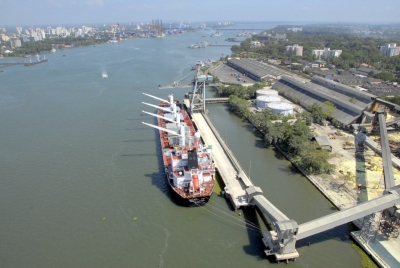
New Delhi, Sep 28 (IANS) The Indian Ports Act, 2025, replaces outdated colonial-era provisions of the Indian Ports Act, 1908, with modern and contemporary regulations that mark a strategic shift toward integrated port development, cooperative federalism, and global competitiveness, and It strengthens institutional capacity, streamlines governance, and embeds sustainability at the heart of maritime operations, the government said on Sunday.
The Act establishes the Maritime State Development Council (MSDC) as a statutory consultative body to coordinate between the Centre and coastal states. The legislation mandates Global Green Norms and disaster readiness for Indian ports. It also simplifies port procedures and digitalises operations to enhance Ease of Doing Business, according to an official statement.
By consolidating port laws and empowering states, the act fosters cooperative federalism and structured development across coastal states. It aims to unlock the full potential of India’s 7,500 km coastline, streamline port administration, and align domestic practices with global maritime standards. As India charts its course toward becoming a global maritime leader, the Indian Ports Act, 2025, stands as a foundational reform- anchoring efficiency, sustainability, and inclusive progress at the heart of port-led development, it said.
The Indian Ports Act, 2025, introduces a modern regulatory framework to enhance governance, transparency, and sustainability across India’s port ecosystem. It empowers statutory bodies, streamlines dispute resolution, and strengthens tariff regulation and environmental safeguards to align with global maritime standards, as per the statement.
The act designates the conservator – appointed by the government – as the port officer, with authority over other officers. The conservator retains powers over vessel movement within port limits and fee recovery, and adds new responsibilities for disease control, damage assessment, and penalty adjudication.
It formally recognises State Maritime Boards established by coastal states and empowers them to manage non-major ports. These Boards will oversee port planning, infrastructure development, licensing, tariff regulation, and enforcement of safety, security, and environmental compliance.
It grants statutory status to the MSDC, which will guide data collection and dissemination and transparency across ports, and advise the Central government on national planning, legislative reforms, port efficiency, and connectivity.
It also mandates that state governments must set up Dispute Resolution Committees (DRCs) to resolve conflicts among non-major ports, concessionaires, users, and service providers. Appeals go to the High Court, not civil courts. The boards may also allow arbitration or other alternative dispute resolution methods. This will benefit speedy dispute resolution.
Tariffs at major ports will be determined either by the Board of the Major Port Authority or by the Board of Directors if the port operates as a registered company. For non-major ports, tariff-setting authority rests with the State Maritime Board or its designated concessionaire. Further, the Indian Port Act, 2025, requires tariffs and charges to be published electronically for transparency.
The Act upholds penalties for safety violations like damaging buoys or mishandling combustibles on board. It strengthens environmental protections by aligning with global conventions (MARPOL, Ballast Water Management) and introducing new mandates for pollution control and disaster readiness. The Central government will conduct audits to ensure compliance with waste handling and emergency response plans.
As India charts its course toward Viksit Bharat by 2047, this legislation stands as a cornerstone reform – empowering coastal states, attracting investment, and enhancing trade efficiency. More than a legal update, it is a blueprint for transforming ports into engines of national progress, regional connectivity, and inclusive development. With its emphasis on digitalisation, environmental stewardship, and structured planning, the Indian Ports Act positions India’s maritime sector to lead not only in cargo volumes but in innovation, resilience, and global leadership, the statement added.
–IANS
sps/vd




